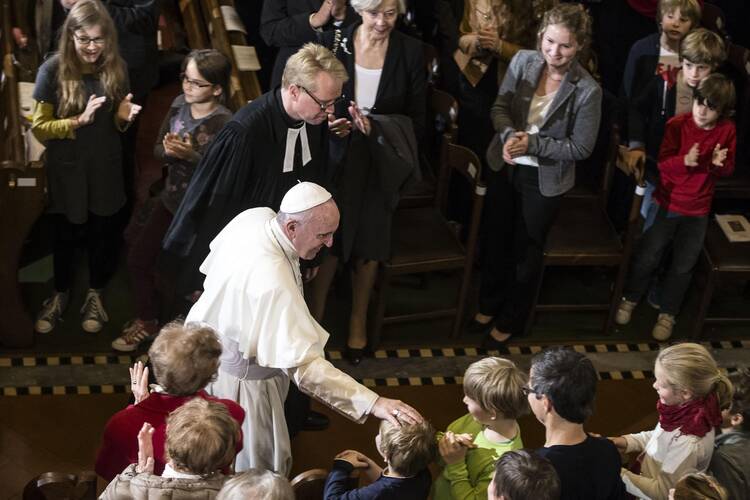An interfaith statement claiming that Catholics and Lutherans are no longer divided on many key issues related to church, ministry and the Eucharist took another step forward on Aug. 10, when members of the Evangelical Lutheran Church in America (E.L.C.A) voted overwhelmingly to ratify the 120-page document. The vote to ratify “Declaration on the Way” comes just weeks before the Christian denomination begins a year-long commemoration of the 500th anniversary of its church’s founding by Martin Luther in 1517.
“Dear sisters and brothers, let us pause to honor this historic moment,” Bishop Elizabeth A. Eaton, who heads the E.L.C.A.’s body of bishops, said following the vote. “Though we have not yet arrived, we have claimed that we are, in fact, on the way to unity.”
Bishop Denis J. Madden, an auxiliary bishop for the Catholic Archdiocese of Baltimore, who co-chaired the task force that drafted the statement, was present in New Orleans for the vote. He was presented with a chalice as a gift from the E.L.C.A.
Bishop Madden told America that he encountered Lutherans expressing “a real longing for unity, for coming together” during the meeting and that, while hurdles remain, ratifying the document “is an indication of how much we are all longing for the day when we can receive the Eucharist together.”
“Declaration on the Way” was unveiled last year, and it compiles findings from 50 years of interfaith dialogue between the two churches in 32 “statements of agreement” on once contentious theological issues.
The task force was created following a suggestion in 2011 from Cardinal Kurt Koch, head of Pontifical Council for Promoting Christian Unity, that the two denominations study the past five decades of interfaith dialogue to find where agreement had already been reached.
RELATED: New Declaration Highlights Catholic-Lutheran Unity
Wednesday’s vote is another nod of approval from a key constituency, but the document does not rise to the level of church teaching for either denomination, and it is unlikely to do so without several more years of dialogue and reworking. The last major theological agreement between the two churches came in 1999, with the ratification of the Joint Declaration on the Doctrine of Justification.
That said, both the Lutheran World Federation and the Pontifical Council for Interreligious Dialogue supported the task force, and earlier this year, the two groups published a common prayer that can be used by both Catholics and Lutherans to mark the Reformation’s 500th anniversary.
Sister Susan Wood, a professor of theology at Marquette University, told America that the next challenge is finding positive reception in Lutheran and Catholic circles for the document.
“This sends a message to the U.S. Conference of Catholic Bishops and the Catholic Church more broadly that there is a hunger and desire on part of E.L.C.A. Lutherans for closer relations with Roman Catholics,” she said from New Orleans in a telephone interview. The E.L.C.A. represents about 3.7 million members in the United States and the Caribbean.
Sister Wood called Wednesday’s vote “wonderful” and “overwhelming” but said much work remains on the Catholic side of things.
“We still have a huge educational challenge before us so that the American [Catholic] bishops are more aware of the document,” said Sister Wood, a member of the Sisters of Charity. Plus, Catholics in the pews have to be made aware of the progress between the two churches. She recommends parishes study the document in order to gain “an appreciation of this shared faith.”
Bishop Madden said that he and other members of the task force plan to send a letter to other Catholic bishops alerting them to the “enthusiasm” surrounding Wednesday’s vote and encouraging them to reach out to their Lutheran peers in order to study the document, pray together and collaborate on social justice issues.
The committee includes three Catholic and three Lutheran theologians, and it is co-chaired by Bishop Madden and Lutheran Bishop Mark Hanson.
The state of relations between Lutherans and Catholics has captured the attention of Pope Francis, who is scheduled to mark the anniversary of the Reformation during a prayer service in Sweden on Oct. 31, the date Martin Luther is said to have nailed the 95 Theses to the door of a German church in 1517. The event kicks off a year-long commemoration of the Reformation by the global Lutheran Church, which includes more than 70 million believers.
The pope raised eyebrows last year when he made comments some interpreted as a green light for a Lutheran married to a Catholic to receive Communion at a Catholic Mass, which church teaching prohibits in most cases.
RELATED: Did Pope Francis Invite Lutherans into the Communion Line?
The document ratified by the E.L.C.A. Wednesday notes that both Catholics and Lutherans believe that in the Eucharist, Jesus is “present truly, substantially, as a person and he is present in his entirety, as Son of God and a human being.”
The document also notes substantial disagreements remain between the two denominations, notably around the role of the papacy and the ordination of women, which the Catholic Church prohibits.
Michael O’Loughlinis the national correspondent for America. Follow him on Twitter at @mikeoloughlin.







